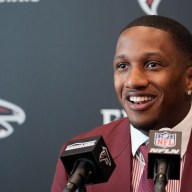 Want to work behind the scenes with Serena Williams? Be prepared to pay your dues. Credit: Reuters
Want to work behind the scenes with Serena Williams? Be prepared to pay your dues. Credit: Reuters
Thinking of a sports career off the field may evoke visions of “Jerry McGuire” and rubbing elbows with players in the locker room. But a career in sports marketing is not all about the glamour of the game. We tapped David Eisenberg, the senior manager of sports and entertainment marketing for American Express, for his tips on making it in (and on) the field. Besides getting a degree in the field and networking as often as possible, here’s what else he recommends:
Explore all sides of the business
Going into sports marketing doesn’t always translate to repping your favorite team. You can work on a brand, like American Express, a property (like the United States Golf Assocation, for example), or an ad agency. “I’ve worked at an agency and a brand, and that’s been a wonderful experience because I’ve learned so many different things from so many different angles,” Eisenberg says. “Think: ‘What area do I feel like would give me the most opportunity to learn as much as I can, have a lot of fun and be really engaged in my career?’”
Remember who you serve
As much as everyone loves the game, at the end of the day, it’s the fans who marketers are ultimately trying to reach – they’re the ones who are opening their wallets. “We’re very focused on really creating those lasting memories for the cardmember [and] at the same time exposing prospective cardmembers to the benefits,” he says.
Realize that it’s not all about the glitz
Though he gets to oversee events, Eisenberg also says desk time is a big part of the job. “The glitz is the glitz only if somebody needs it or wants it,” he says. “[We’re] more focused on, ‘How do we create scalable experiences for lots of people to take advantage of?’ And if that means it is more focused on service, which may just be getting a lesson, versus getting the opportunity to meet a famous golfer, we want to make sure that we’re able to reach as many people as we can, with the benefit that’s gonna make the biggest impact. If it’s glitzy, great. If it’s not, that’s OK, because the important thing is it may give us the scale and it may also give us the opportunity to really build a meaningful relationship.”
Three skills you need
Natural curiosity: “If you’re naturally curious, you’re gonna want to always be exploring the next evolution, thinking about innovative opportunities that exist,” says Eisenberg.
Courage: “[If] you think there’s something really there, you’ve done your homework, you understand what the opportunity is, [have] courage for what you believe in.”
Conviction: “Conviction in your own ideas and the hard work to achieve them are some of the most important qualities to have in your career,” he says. “Conviction and hard work will humble you when you see it, and inspire others to emulate it when you demonstrate it. And the best thing about conviction when it comes to sports marketing for me, is that I’m passionate about my work, so really there is nothing ‘hard’ about it.”
















